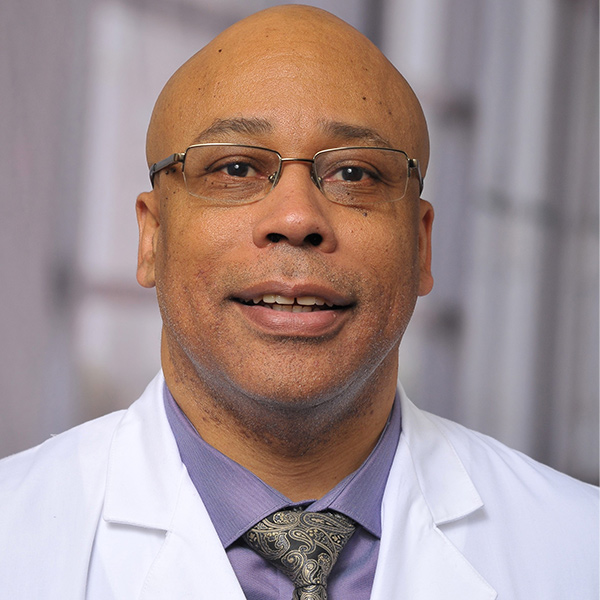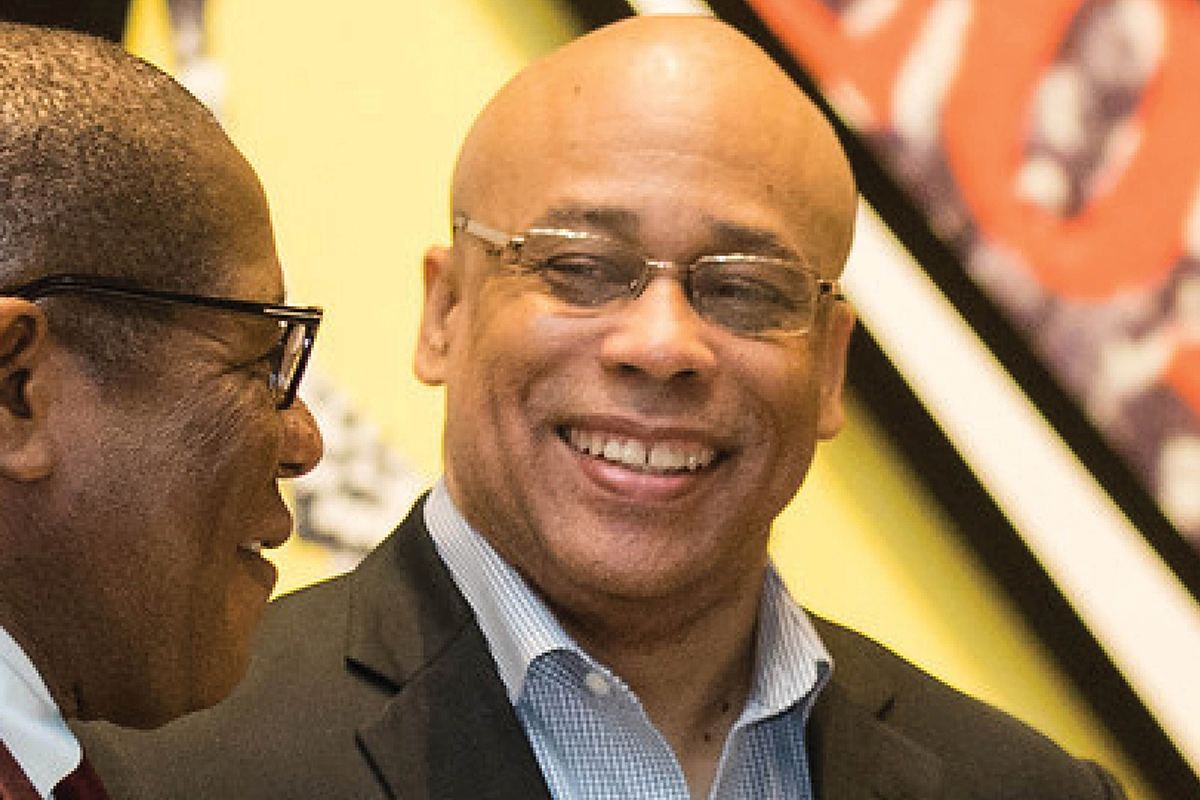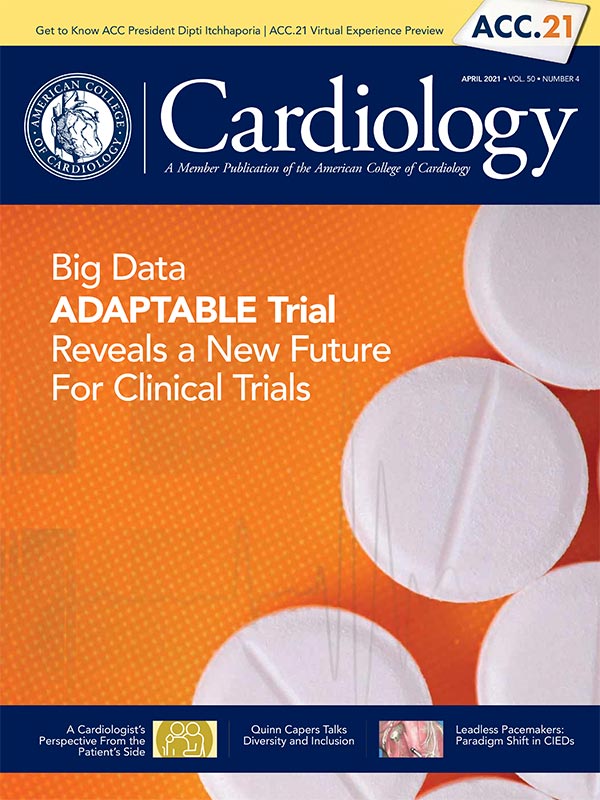Get to Know Your Leaders | Quinn Capers, IV, MD, FACC: Paving the Way to a Diverse and Inclusive Profession

Changing culture doesn't happen overnight, but Quinn Capers, IV, MD, FACC, is up for the challenge. As chair of the ACC's newly formed Diversity and Inclusion (D&I) Committee, Capers will lead the College in further delivering on the strategic priorities developed by the College's D&I Task Force over the last several years. Capers, an interventional cardiologist who also serves as the associate dean of faculty diversity at the University of Texas Southwestern School of Medicine in Dallas, talked with Cardiology about his goals for the committee and the ways in which a more diverse workforce can serve as an antidote to racism as a public health issue. He also provides his tips for ways clinicians can increase inclusivity by incorporating smaller actions into their daily lives.
Tell us about yourself. What is your "day" job? In what ways have you been involved with the ACC?
I have two "day jobs." I am a diversity leader at my institution, working with colleagues to enhance the diversity of the medical school faculty and leading diversity, inclusion and equity efforts in the department of internal medicine. That work takes approximately half of my time; the other half of my time is devoted to the practice and teaching of interventional cardiology.
I have been a Fellow of the ACC for years. My formal activities started several years ago when I was asked to co-lead a task force on the cardiovascular training council dedicated to enhancing diversity in fellowship programs. This led to being recruited to serve as an inaugural member of the D&I Task Force under the leadership of Pamela S. Douglas, MD, MACC. Now that task force has become a committee of the College. I am honored to serve as the first chair of the D&I Committee.
Congratulations on becoming the chair of the D&I Committee. What are your plans and what do you hope the committee will accomplish in the year ahead?
The Committee will continue its work to enhance diversity and a culture of inclusion in our specialty and in the College by producing educational material and policy statements; recruiting and developing diverse leaders in the organization; installing permanent structures in the College; and battling racism, bias and injustice in medicine and cardiology. This work never ends. Whenever you take your foot off the gas pedal, gains can recede quickly. Personally, I would like to add to the work being done through our talented work groups by forging a closer relationship with the ACC's Scientific Publications Committee and working more closely with our peer organizations, including the Association of Medical Colleges, Accreditation Council for Graduate Medical Education, and our fellow heart organizations.
What do you think have been the ACC's biggest accomplishments in the D&I arena?
We have made great progress in recruiting diverse cardiologists for our clinical trials training program, grooming them for leadership in clinical research; in exposing high school and college students to the profession of cardiology; in training cardiology leaders in implicit bias mitigation; and in working with program directors to address barriers to diversity in cardiology training programs. There are many more achievements, but these are a few that have been achieved in a short period of time.
In a previous interview, you've stated that racism is a public health issue. Please explain your view on this and how creating an inclusive workforce that's representative of the patient populations will improve health outcomes.
The belief that people of certain races are less intelligent, less hard-working, and less worthy of the opportunity to pursue freedom and happiness led to slavery, Jim Crow laws, discrimination against immigrants, housing discrimination, and other socioeconomic barriers to good health and education.

The legacy of this structural racism is a direct contributor to the poor health statistics of Hispanics, Blacks, Native Americans, and other groups in this country.
Add to this the individual racism and biases held by some professionals and the result is racial disparities in health care, the criminal justice system and educational institutions. As a result, some minority groups are not only less likely to have access to health-promoting factors like healthy food, clean water and air, and safe places to exercise outside, but when they are stricken by diseases and engage the health care system, they are often less likely to be treated with state-of-the-art, evidence-based medications and procedures.
This is what we are confronting in 2021. While the situation is clearly multifactorial, one culprit driving health care disparities is the lack of diversity in the physician and cardiology workforce. Many, including me and all past and current members of the D&I Committee, believe that a more diverse workforce will improve the quality of health care for all segments of society. When we produce more diverse physicians and train them to be leaders, the result will be physicians of all demographic groups working together, reducing "out-group" biases, and enhancing innovation in clinical care and research. More Hispanic, Black and Native American doctors will also increase the number of physicians dedicated to serving underserved populations.
Over the past year, there has been a lot of talk and a lot of articles about racism, new/renewed awareness of the disparities in health care and in outcomes, and the impact of one's Zip code on health. Is there one, or perhaps more, things that you think people have missed or overlooked?
I don't think it has been overlooked but it bears repeating that enhancing diversity in the health care workforce is one powerful weapon to combat the ills brought forward in this question. Clearly, changing laws and policies that determine the social inequities in how we live will have an even greater impact. But to achieve the best outcomes, we need to work on changing those social determinants of health and enhancing diversity in medicine simultaneously.
A new term has entered our lexicon: microaggressions. What is it and is it different from implicit bias?
Microaggressions refer to the brief, sometimes daily, perhaps unintended insults suffered by many of us as we go about our daily work and life. Often, they go unconfronted because they are so numerous that to take the time to address them all would be an enormous drain of time and positive energy. But the cumulative weight of them can be harmful and damaging to the self-esteem.
Quinn Capers, IV, MD, FACC
Examples might be a minority medical student in the hospital being mistaken multiple times for a janitor or a woman physician being referred to by her first name instead of being called "Doctor" like her male colleagues. Implicit bias is the unconscious association of groups of people with certain characteristics, like the automatic association of woman with "homemaker" or a Black male with "danger." This differs from sexism or racism because unlike those explicit biases, the associations are made outside of our conscious awareness or control. The two are related in that biases often influence how we treat others, so that implicit biases can lead to microaggressions.
What is one thing a person could make a part of their day, every day, that could move us all forward to meeting our goal of greater inclusion and representation?
D&I at ACC.21
Click here to access the ACC.21 Program Planner and search "Diversity" for a listing of sessions addressing topics related to diversity, equity and inclusion. Highlights include:
- Session 6512: Achieving Gender Equity in Cardiology
- Session 700: Clinical Trials Research: Upping Your Game
- Session 788: Professionalism and Ethics in Cardiology
Also visit the Convocation section of the ACC.21 virtual site to celebrate ACC.21 Distinguished Award winners, including Capers, and welcome the newest FACC and AACC members to the College. Use #TheFaceOfCardiology and #ACC21.
Force yourself to spend time with someone from a group different than your own: a different race, religion, sexual orientation, physical ability, etc. Go to lunch with a different group than your usual group, ask a new person for a coffee chat, or invite someone in a different demographic with whom you have common academic interests to join you on a project or publication. In doing so, you will undoubtedly see traits that you admire in people from all groups, which will lead to a reduction in implicit biases.
What gives you hope that real and sustainable change is happening and is possible?
Over the last decade we have witnessed the percentage of women medical students increase such that it now reflects the proportion of women in society and we are seeing some slight gains in diversity in cardiology training programs. While the progress for women has been more robust than the progress for underrepresented minorities, the progress is real and will not stop. Many people are working very hard to diversify medicine. Also, every time I see an assessment of the level of explicit or implicit bias in different age groups, the results are the same: compared with older Americans, younger people have less racial bias. This gives me hope for the future.
During ACC.21, you will receive the Pamela S. Douglas Distinguished Award for Leadership in Diversity and Inclusion. Congratulations! What does it mean to you to be recognized by this award?
Learn More
Visit ACC.org/Diversity for more information on ACC's D&I activities, as well as focused resources for addressing topics like racism and bias, and listings of upcoming webinars and events.
I am humbled and deeply honored that my colleagues thought I was deserving of this award. I have worked with brilliant colleagues around the country who are passionate about combating racism, bias, and the lack of diversity in medicine, and I have learned from them. While the award is given to an individual, my achievements are all group achievements.
I have a great deal of respect for the ACC as a change agent in our profession, so I am very proud to be the recipient of one of its "distinguished" awards. I met Dr. Douglas in 2016 and I've been tremendously impressed by her energy and passion for this very important work (which started way before 2016); she is truly a trailblazer. That the award carries her name makes it even more special.
Anything else you'd like share with this opportunity to speak to all ACC members?
In response to health inequities exposed by the COVID-19 pandemic and national events of racial intolerance in the last few years, there is a global call to end racism and bias in every aspect of American life. Medicine and cardiology have a role to play. I am so proud of the ACC, the Association of Black Cardiologists, American Heart Association, and other organizations that are accelerating their work to diversify our profession and eliminate health care disparities.
Clinical Topics: Cardiovascular Care Team, COVID-19 Hub
Keywords: ACC Publications, Cardiology Magazine, American Heart Association, Awards and Prizes, Education, Medical, Graduate, Accreditation, African Americans, Antidotes, Capparis, Coffee, COVID-19, Criminal Law, Emigrants and Immigrants, Fellowships and Scholarships, Freedom, Faculty, Happiness, Healthcare Disparities, Hispanic Americans, Goals, Hospitals, Leadership, Minority Groups, Outcome Assessment, Health Care, Physicians, Women, Public Health, Quality of Health Care, Schools, Medical, Social Determinants of Health, Sexism, Socioeconomic Factors, Racism, Religion, Students, Students, Medical, Vulnerable Populations, Health Workforce
< Back to Listings


